Visions for economy development: Populism or realism?

Which economic changes do the political parties promise?
Various in-depth issues bothering our country, our society are being touched upon during the debates launched at “Pressing” Club under “168 Hours” newspaper. The project is implemented in partnership with “DEPOP” Institute for Governance, “AZAD Pharma AG” ltd and “168 Hours” newspaper.
This week’s topic was visions for economy development of the political parties taking part in the upcoming Parliamentary elections: “Populism or Realism?”
Participants of the debate are: Vilen Khachatryan, president of economic commission of “Armenian Renaissance” political party, Mane Tandilyan, financier-accountant, member of “Yelk” alliance, Ashot Yeghiazaryan, Doctor of Economy (“Free Democrats”), Mesrop Arakelyan, member of “Tsarukyan” alliance.
The debate is conducted by Babken Tunyan, economic commentator at “168 Hours”.
Babken Tunyan: I propose to start our debate from the following question: to which extent economic programs are stressed by voters and have an impact on election processes? To which extent does the electorate read them?
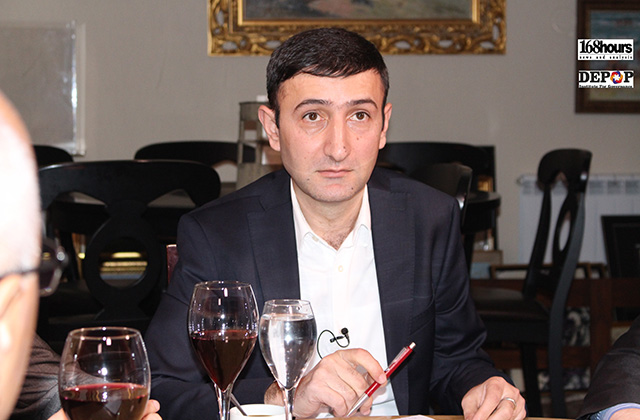
Mane Tandilyan: The topic is really important, as you formulated your question, seemingly importance of programs isn’t observed, moreover, economic programs, as their connection to the lifestyle isn’t accessible to a wider mass of people. Naturally, it’s reasoned by their social conditions, it’s difficult to explain to the people what connection economy has to their daily life. I’m a financier-accountant and people’s lifestyle is more subject to me linked to use and consumption of their incomes, which, you’ll also state, that it has a direct connection to activation and development of our economy. How do we see Armenia’s economic development?
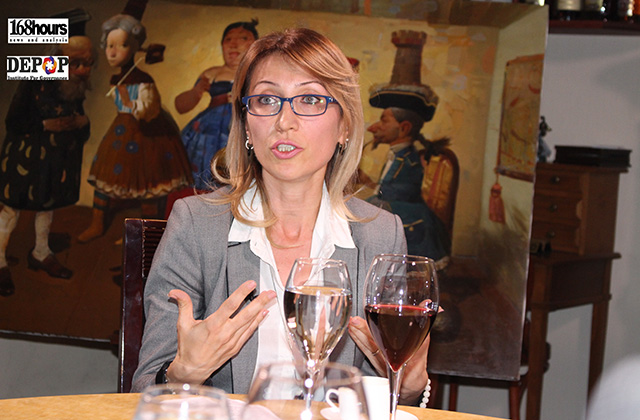
“Yelk” alliance considers that Armenia’s economic development should be directly linked to enlargement of SMEs, i.e. middle class. Economy development has connection to it, regarding how developed SMEs are, how middle class person lives in Armenia, what active business is available in our country under those conditions? We know that it’s extreme poverty or wealth in our country, in our deep belief it’s a result of economic underdevelopment. The reasons are different: there are both external and internal risks and reasons, however, all will agree, that here there is no aura for investments, and small investments is one of the reasons, that economy is in a hard condition. We also know that reductions have been recorded regarding investments, which considerably damage our economy.
Babken Tunyan: Mr. Yeghiazaryan, your program is one of the largest ones, if I’m not mistaken more than 130 points. In your opinion do people totally read them, or what do you do to stir interest? Will voting be made on the basis of the program or not?
Ashot Yeghiazaryan: The introduced program, of course, is shorter, and besides economic provisions it also involves provision referring to other fields. Of course, what is developed by our candidate for the PM Hrant Bagratyan’s economy laboratory is introduced by a separate package, only economic component of our program, however, I’d like to add some important point here, that returning to your question, that political parties are discussing economic programs, propose certain perspectives to the voters, it really used to happen throughout previous years. Main part of proposals of political parties comprised the very economic component. However, there is one point here: on the whole, introduced programs were limited, i.e. they were limited by domestic policy issues, and economy was observed within that dimension. However, we know, that economy has direct connection to foreign policy, i.e. external component of economic policy always lacked.
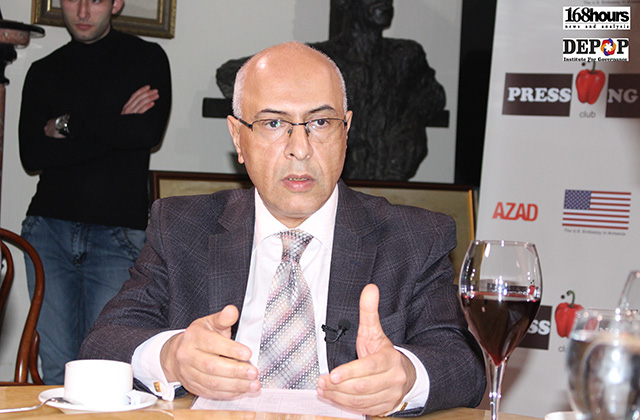
In this regard I consider our program is unique and differs from programs available on the arena today, submitted by the political parties. What’s its difference? External political component, external political orientation is rather clear. We consider Armenia’s economy may have development perspectives with the European Union by integrating into its economic space. We consider Armenia should withdraw from EEU as soon as possible, i.e. Armenia freed itself from those restrictions, as they immediately refer to sovereignty. If Armenia isn’t a sovereign state, it can’t independently enter into relations with other partners (EU, Iran, USA). Here we have restrictions, like the government has, i.e. other programs, basically don’t differ from the government programs, they may sound well, and basically resemble one another, however, without any clear political orientation.
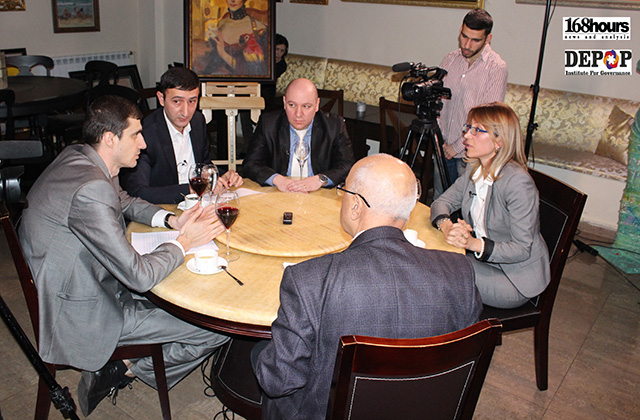
Besides exiting from EEU we propose visa free regime with the EU, implementing big regional projects with Iran. We intend to raise relations with the US to a new level. By all this, I consider, our program differs from others, and its economic component varies as well. It’s true, I didn’t see programs of all political parties, as I know they haven’t been published yet, there are certain provisions, which, I think aren’t complete. And the program proposed by us and developed by Hrant Bagratyan is a complete and comprehensive document, i.e. here all parameters are conditioned by one another. There is no any issue of populism, as accepted 6.5-7.5% yearly growth, if such needs to be provided, all parameters are connected to it.
Babken Tunyan: We’ll cover issues on EEU and separate provisions. By the way, we haven’t reflected to populism yet, as besides RPA all political powers represent the opposition wing, accusation of that populism about all programs was heard. Mr. Arakelyan, do you agree with the observation by Ashot Yeghiazaryan, that the program of “Free Democrats” is unprecedented and most grounded in that regard. I guess your program was published earlier and was much discussed, regarding populism as well.
Mesrop Arakelyan: As Mr. Yeghiazaryan said external political factor lies on the basis of economic component of the program introduced by “Free Democrats”, in particular, exit from EEU. However, factors of economic development, which were stated, visa free regime with the EU, Iran, the USA, are those partners of Armenia ready to have the cooperation level, providing the opportunity to develop Armenia’s economy? We consider not our membership to EEU is the reason of Armenia’s current state of economy, but Armenia’s incumbent authorities and the policy they pursue, which generates a crisis of trust, i.e. from small business, which has no any connection to EEU, to big international investments. We consider the main reason should be inside Armenia, and only after it, if we may reach certain level of economic development, relations with external partners may be brought to the basis of the issues.
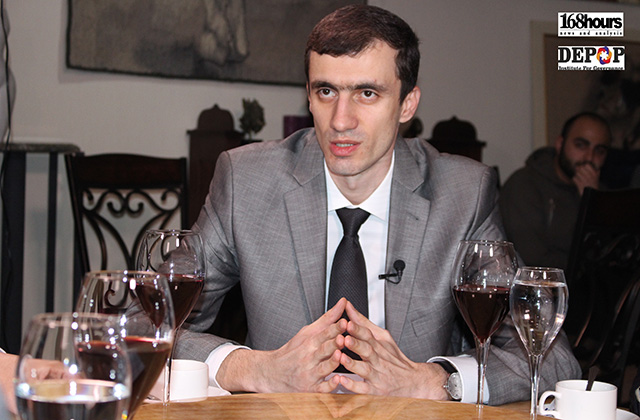
Under established trust crisis, that the consumer doesn’t know what will happen to him/her in a few years, i.e. he/she starts saving, doesn’t do any purchase, economic passiveness, the very trade volumes we see are reducing every year, or decrease of foreign investments, have no connection to EEU membership, as prior to membership Armenia’s economy was in the same situation. Issues of present-day economy come from previous years, and I don’t think that the main issue is our economic external orientation, or after leaving EEU doors of the EU will be open before us, like they were for Georgia or Ukraine. Also economic relations with the USA, I don’t imagine on which level they should be, what impact they may have on an ordinary habitant.
Ashot Yeghiazaryan: I disagree. First, both the EU and other partners proposed projects, cooperation. If you remember, in 2013 we were to sign the Association Agreement (AA) with the EU, including DCFTA. It was anticipated that immediately after it a conference of donors should be invited and Armenia was to receive grant amounting 4 billion Euros. A grant, which could have been used per directions.
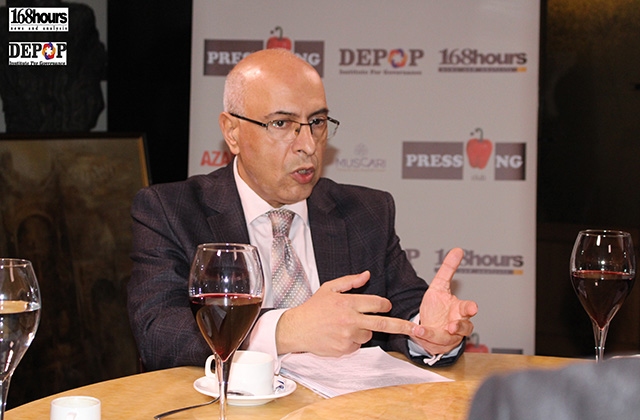
Mesrop Arakelyan: Will that 4 billion contribute to economy development by the style of current government activity? Such 4 billions are coming and leaving.
Ashot Yeghiazaryan: The most open part, infrastructures—irrigation system, reservoirs, agriculture, roads, it should fill the gaps in those directions without any interest, and return of the debt. Naturally, after it other projects, models were appearing.
Vilen Khachatryan: Why should have they provided that 4 billion for nothing?
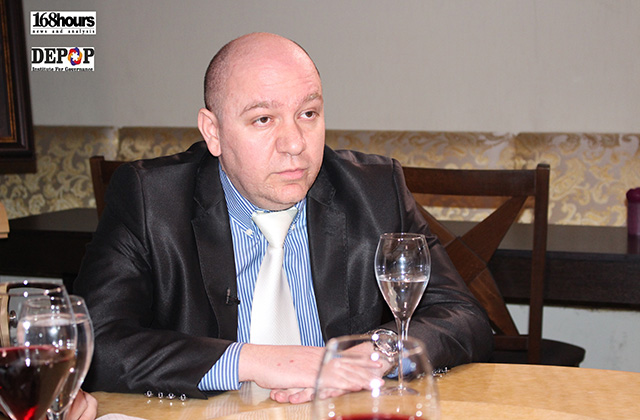
Ashot Yeghiazaryan: As it was decided so. Georgia received it. We are their partners, we were to approach their standards and criteria, as the EU can’t involve associated member, consider them a part of its economic space, and they remain weakly developed. They were to support us for development. Yet from 2010 Iran proposed a free trade agreement: it wasn’t signed. I don’t say prior to EEU there were no obstacles, they were numerous. Again out of political reasons all those projects in regional and Iranian direction were prevented, as Armenia’s economy has adopted a dependent development direction. It means you are an outskirt of Russian economy and appearance of new players there simply cuts you off from that space. And in 2013, i.e. when EaP started to intensively develop, and it was already clear that the EU includes those 6 EaP countries in its system, they associated with the EU, it caused Russia’s aggression, and our development was banned. It’s impossible to develop economy if you don’t adopt independent decisions.
Mesrop Arakelyan: When did Georgia sign the AA?
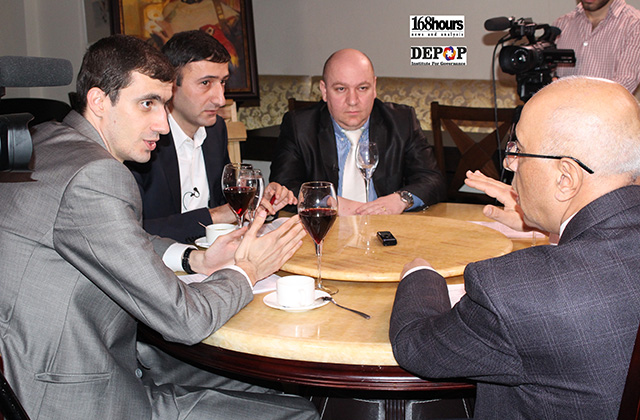
Ashot Yeghiazaryan: Excuse me, we had already consumed our resources for growth.
Mesrop Arakelyan: By what?
Ashot Yeghiazaryan: They were certain loan means, transfers, however, structure of our economy wasn’t changed. Branch structure of our economy should have been improved, so that we diversified our markets. Also our economy should have had a branch structure able to provide new. We have consumed growth reserves, and that growth is only possible with the EU space, as that development zone has that developed branch structure. That zone, called EEU, doesn’t have that structure, we have nothing to do here, and we have nothing to propose, nor they have anything to propose besides some energy resources, and they always use it against us as leverage.
Vilen Khachatryan: Of course, many issues have been touched upon, let me first reflect to the impact of economic component on pre-election program, and whether the society makes a choice based on those components. If it were so, I consider after 2008-2009 financial and economic crisis—14.1% decline, we should have recorded real regime change.
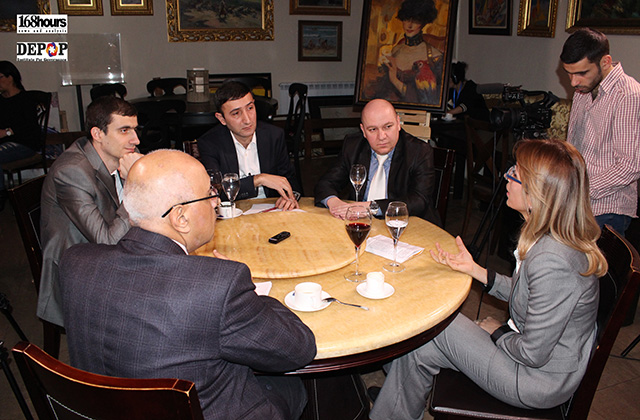
Thus, conclusion may be drawn that in Armenian reality economic indices: low economic prosperity, growth, development and etc., don’t lead to system review. This urges to come to the conclusion that as such economic even actual condition, which a person feels on his/her pocket, throughout 4-5 election years, doesn’t have an effect on his/her final decision.
Babken Tunyan: In this case why do you make programs?
Vilen Khachatryan: I agree, but I’ll say what the concept of the program is. I brought the economic ground, which doesn’t have an effect on decision-making, however, if there is a chance, at least having the power by non-economic factor, in all cases the coming new power, which may have leverages of influence on real economy, should introduce the vision, on the basis of which it imagines the upcoming 5 years.
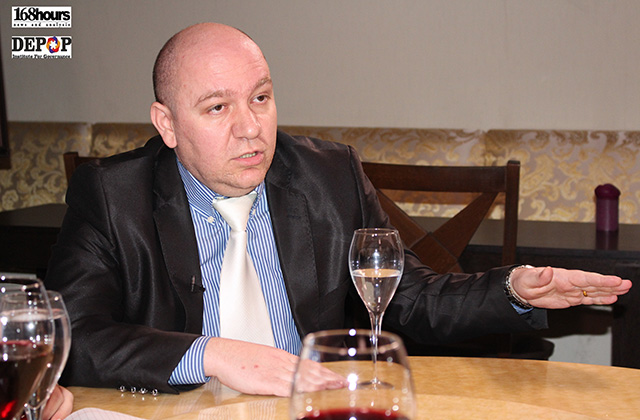
Thus, in some sense, proposing an alternative to the incumbent, due to which the country appeared in this situation, i.e. the concept is introduced from this perspective. I fixed also, that for the society, even if he/she doesn’t read the program, he/she has already felt it on his/her own pocket, and should condition choice by that. I also lived a bad life under incumbent authorities, I should also seek an alternative.
Ashot Yeghiazaryan: But you don’t provide that alternative, like the authorities, you say the same with a bit thick colors.
Vilen Khachatryan: Did you read our program?
Ashot Yeghiazaryan: Provisions, as much as they’re introduced.
Vilen Khachatryan: You mentioned in your speech that you haven’t read programs of other political parties, and you know as much as provide media outlets, you didn’t fully read them, accordingly, your conclusions, which you introduce on the level of comparisons, you introduce on the level of repetitions…
Ashot Yeghiazaryan: I can already draw conclusions: you intend to keep Armenia by oil and gas.
Mesrop Arakelyan: The authorities don’t propose it, thus, it differs…
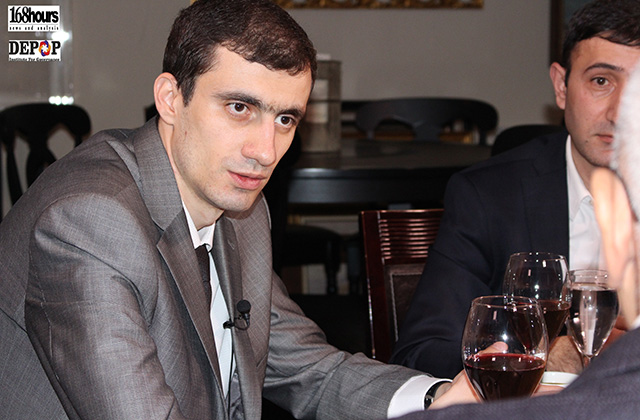
Vilen Khachatryan: If you say you haven’t fully read the programs and you aren’t familiarized…
Ashot Yeghiazaryan: Oil, gas, I heard them, it’s enough.
Vilen Khacharyan: I also heard a lot just now.
Ashot Yeghiazaryan: What?
Vilen Khachatryan: That we can live only by Europe, you say let’s break ties with all other countries, we don’t need Russia…
Ashot Yeghiazaryan: We didn’t say something similar.
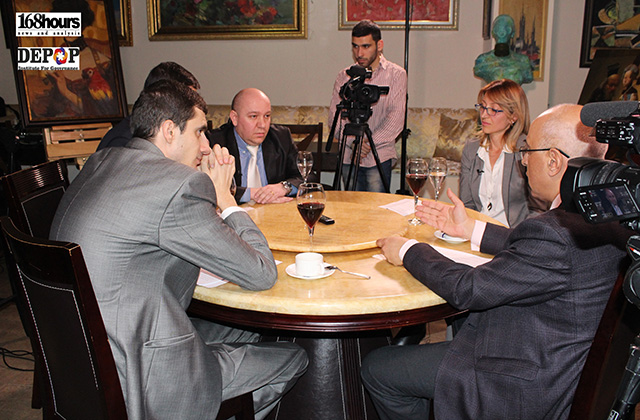
Vilen Khachatryan: I don’t reflect to your program, as I don’t intend criticizing anyone’s program, it isn’t interesting to me. That’s why I didn’t read it. If you already reflected to our program and have read it, and gave importance, it already states about privileges of our program. As for the issues by which program provisions and differences we appear, naturally, it isn’t repetition. Recently 30 points have been introduced with its all financial components, regarding on account of which financial resources and impacts of each proposed point should provide positive solutions to our economy. Positive solutions from the component of illegal financial flows up to the component of productive consumption of budget means, which relate both marrying couples and people with disabilities, as well as pensioners, all those components have been fully introduced with their financial calculations.
Mesrop Arakelyan: How much do budget expenditures comprise for program implementation?
Vilen Khachatryan: I can’t say, as such we haven’t calculated yearly total, we have calculated components of expenditures to be implemented for separate program provisions.
Mesrop Arakelyan: How realistic is the point that these much expenditures will go toward implementation of your program?
Vilen Khachatryan: It may have two preconditions. First and foremost, during that budget debate, if we have the leadership leverage, which in the final result, i.e. may have an effect on voting and budget, naturally, by counting those components only regarding reduction of subsidies I may say that 122 billion is allotted (in 2017 that index is planned), greater part of those measures, even around 100 billion, we were proposing to direct to social programs, and not to incomprehensible organizations, which get subsidies in an unknown way. Thus, if, e.g. budget kickback system, adjusting of those means through non-program approaches of unproductively wasted budget is touched upon, we have concrete proposal for them.
For instance, AMD 500 thousand allotted to the marrying couple, which I count on the basis of 18-20 thousand marriages, isn’t a considerable burden on the budget, however, it may become the ground for many families, by which the latter will attempt to at least build their family and have privileges regarding solving social issues. Program provisions are numerous and if, e.g. it’s stated that foreign policy bloc almost lacks in other programs, foreign policy from de-offshorization of Armenia’s money have been calculated, accordingly, if you make such statements, look to our program bloc.
Ashot Yeghiazaryan: It isn’t a foreign policy, you should express your clear position regarding foreign policy. Are you against the future agreement to be signed with the EU? Are you against association?
Vilen Khachatryan: Our life isn’t limited only by the AA. We support consistent, complementary policy model, from EEU to EU.
Ashot Yeghiazaryan: Do you support AA?
Vilen Khachatryan: Don’t direct my question. We also support AA components. If there is the domain of points of intersection, providing the opportunity to cooperate with the EU as well…
Ashot Yeghiazaryan: Doesn’t EEU provide that opportunity? Where is your complementarianism?
Mane Tandilyan: Mr. Yeghiazaryan, frankly speaking, I’m surprised: not being familiarized with the programs and interfering this way, considering that others have no imagination how to develop, what to do. For instance, our program involves different steps, and if you have read it, you’d see that economy bloc separately lacks, why? As different fields have connection to economy, including, e.g. corruption. Can we state that in our country corruption is on a high level, as it’s today, any economic activation, investments, we should understand, that they’ll be limited and it’s natural.
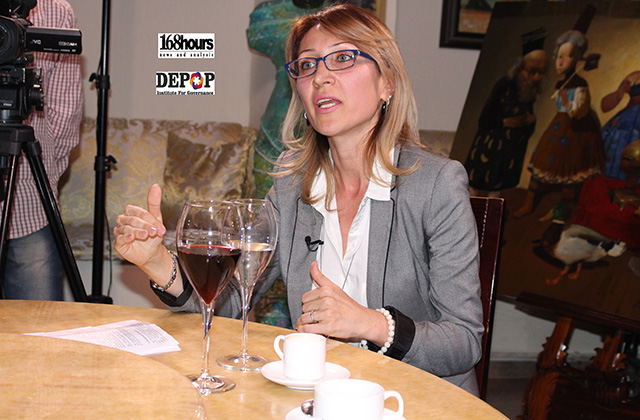
If there are businessmen not paying taxes or privileged ones, business aura, it’s natural that economy development should be prevented. And here, let me not agree with you [to Mesrop Arakelyan] that you say by what EEU prevents. By the very point that here we are in one team, and you call it a team of losers, who have failed democracy development in their country, due to which obstacles contributing to economy development can’t be overcome.
Mesrop Arakelyan: Do you mean that EEU is guilty that we have shadow economy, corruption?
Mane Tandilyan: Corruption has always existed, as we aren’t capable of overcoming it due to not having democracy methods. We all realize that in fight against corruption grants and investments are incomparable with any other state, right? As those amounts we urgently need, as we aren’t able to develop economy independently, we take them and as if fight against corruption. We all know in which condition fight against corruption is and due to it we install tax mechanisms, which should have been assistance to businesses, however, we don’t know how they’re used.
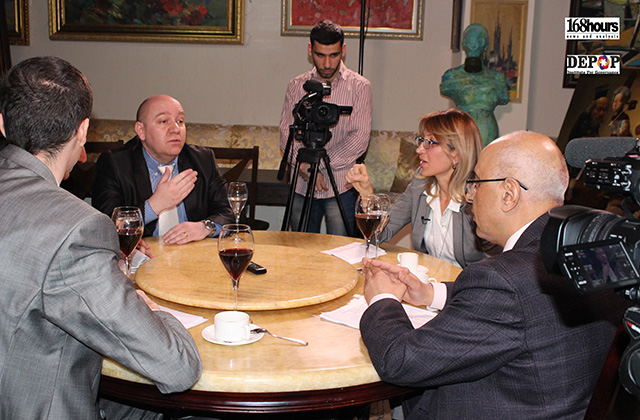
Mesrop Arakelyan: Thus, if a few years ago instead of EEU we signed an agreement with the EU, would that corrupt leadership change?
Mane Tandilyan: When we speak of development, the investments we had, were to lead to the development of the state of Armenia, as well as boosting business and economy aura. We have disrupted it, and I agree, however, by joining EEU, we even more lead the process to regress, that’s the point. Have you even seen any state develop in the same team as much to have a qualified production that exists? We say European countries don’t accept our goods, of course, they shouldn’t accept low-quality production. Instead of developing and making our production qualified, we complain that they don’t accept it.
What I want to say, these states and AA created favorable conditions to develop our country, raise the quality of our production, that we were able to feel complete and build a dignified state.
Mesrop Arakelyan: I don’t want to become a EEU attorney, but excuse me, the very Kazakhstan is developed from many East European countries by several indices. We are the guilty, and not EEU.
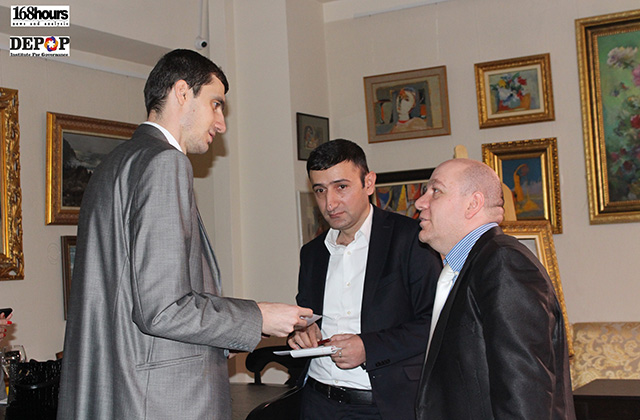
Mane Tandilyan: I mean we had chances and we have lost them, it isn’t enough, we even restrict us—transit of Iranian gas through the territory of Armenia and gaining all the benefits from it. Why can’t we do that? As our issues are with Russia.
Mesrop Arakelyan: Thus, you state, if you come to power and we stay in EEU, you can’t change anything. It’s necessary to launch a referendum to exit EEU.
Ashot Yeghiazaryan: No, referendum isn’t needed.
Mane Tandilyan: I didn’t catch, what did you decide? That on the one hand, it’s necessary, and on the other, it’s natural that exit has its issues and risks; everything needs to be recalculated. But, yes, you consider it a political step preventing Armenia’s development.
Babken Tunyan: My question to Mane Tandilyan and Ashot Yeghiazaryan, as you both consider membership to EEU wrong…
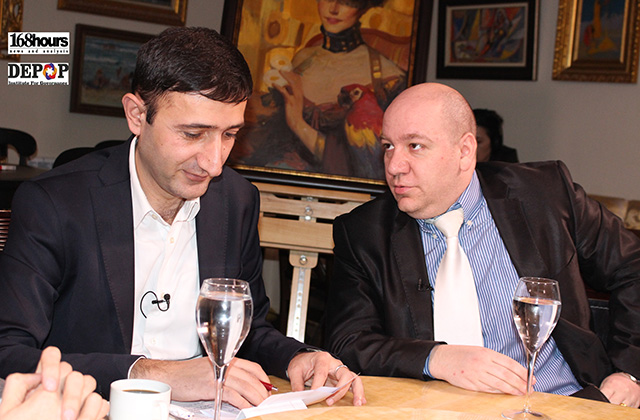
Ashot Yeghiazaryan: We don’t consider anything wrong, we say we should exit as soon as possible, they don’t.
Mane Tandilyan: You don’t listen, when I speak, Mr. Yeghiazaryan.
Babken Tunyan: I want to understand that very point. How do you imagine exit from EEU? What should you do? Do you have a clear analysis calculating benefits of leaving EEU and integrating into the EU economically? We used to have such an analysis, calculating the benefit of joining the EU, and recently, we had an analysis calculating impact of EEU. I mean does you posture have any specialized grounding that people understood what will happen then?
Mane Tandilyan: First, when you say we support it, and they—I don’t know, the issue is as follows: if we, as a state have joined a union and assumed some liabilities and responsibility, finally, we have signed it as a state, we should realize what implication has refusal from that signature. Yes, here those calculations and risk assessment should be made, what it may lead to.
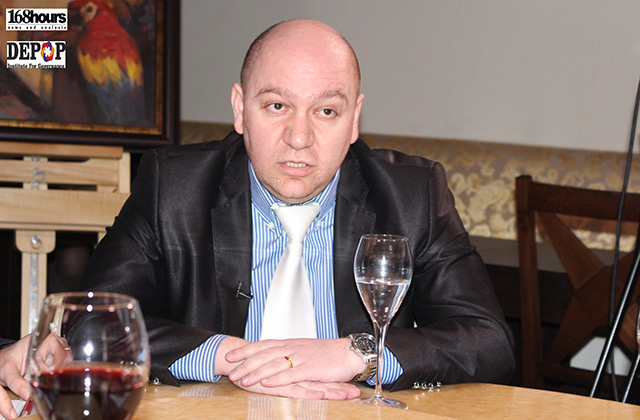
Babken Tunyan: You mean you’ll do the calculations then.
Mane Tandilyan: No, I mean, which are our risks from the agreement if we leave EEU tomorrow, what risks and liabilities lie on us and get acquainted with those risks, and in-depth analysis is necessary to implement. However, the fact that it’s a political mistake and we should free ourselves from that, however, at the same time, conducting calculations, which you have just said…
Babken Tunyan: That is to say, if you calculate and feel, that there are many risks…
Mane Tandilyan: Risks can’t be numerous, when we particularly touch upon the economic part, we only need to understand how much they are and how we can cover them.
Vilen Khachatryan: We have forgotten Artsakh component.
Mane Tandilyan: I didn’t forget it, relations with CSTO are on quite a different platform.
Vilen Khachatryan: To keep it, and leave the other?
Mane Tandilyan: I want to understand generally in which relations are the states inside with Armenia, when we have the rhetoric we have, when during negotiations our Kazakh partner remembers Aliyev. So I totally disagree that CSTO provides such a security to Armenia…We are deeply convinced that it’s necessary to seek other opportunities of Armenia’s security, and first and foremost, rearm our army with military and industrial various technologies, other types of solutions and etc.
But I want that we clearly imagined this exit. As a state representative, I consider it isn’t serious and non-partner, when you are in a relationship and you show your back, like we did with the EU. This is impermissible, and as a state, we need to be more serious and assume responsibility to correct our mistakes efficiently, if it’s a mistake, and we consider it to be such.
Mesrop Arakelyan: Exactly which obstacles have emerged as a result of membership to EEU? Which are the issues recorded absolutely as a result of EEU and lacked prior to that?
Mane Tandilyan: Firstly, it’s a serious issue for me that we can’t receive investments, which we had prior to involving in EEU. Different analyses clearly show that we had various investments, which have been reduced, and our expectancies from Russia or EEU capital weren’t justified. Yes, volume of export to EEU countries has grown, it’s natural, however, it doesn’t mean that it’s good. At the same time, when there are negotiations to improve those conditions, I speak of it.
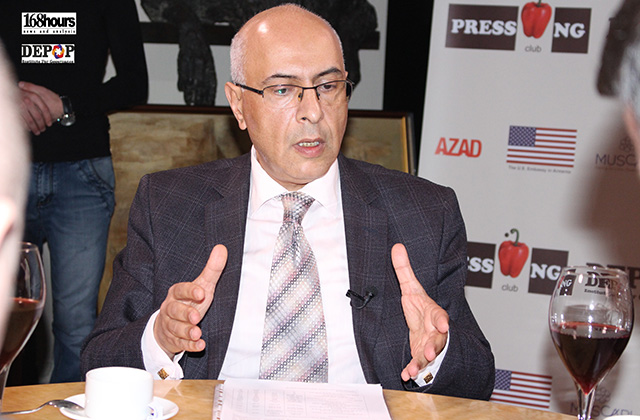
Mesrop Arakelyan: That is to say, if there is a normal state, there was no corruption, within membership to EEU we won’t receive money from Europe, will we? Money doesn’t recognize territory.
Mane Tandilyan: It does, if you have not the opportunity to independently make economic decisions…
Mesrop Arakelyan: What connection does foreign investment have? If you have normal economic conditions, normal tax field…
Babken Tunyan: Let me reformulate Mesrop Arakelyan’s question. To which extent is investment decrease in our country conditioned by the very membership to EEU? Is there such an analysis showing that dependency?
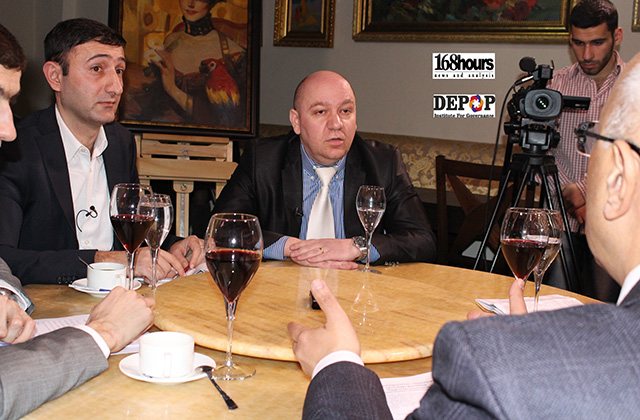
Ashot Yeghiazaryan: Of course, it exists.
Babken Tunyan: How much does it comprise?
Ashot Yeghiazaryan: It totally depends. However, there were a few issues, I need to reflect to them. Of course, regarding the point, that linked to corruption, monopolies EEU is an obstacle, I accept that, and I don’t accept the view that more free game rules may be available in EEU or one may more productively fight against those vicious phenomena.
Mesrop Arakelyan: It means if you come to power, and we don’t leave EEU, will the situation even worsen?
Ashot Yeghiazaryan: If we come to power, we’ll exit.
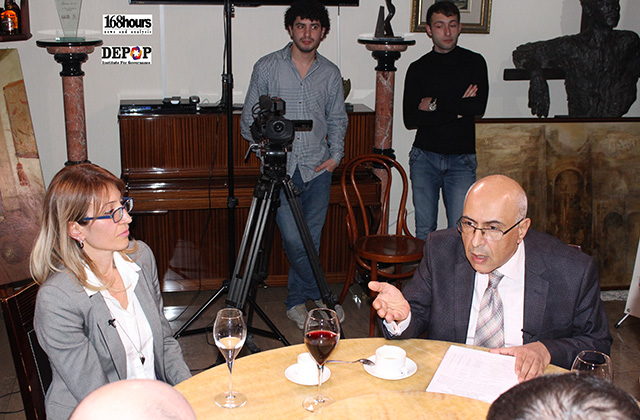
Mesrop Arakelyan: Will it more worsen if we fail to leave?
Ashot Yeghiazaryan: Of course, it will. Have you observed anything different? “Armenian Renaissance” leader brings arguments of membership to EEU, that there is Abkhazian railway, that we’ll have cheap gas and that’s all, he doesn’t bring any economic argument.
Mesrop Arakelyan: I don’t mean that. Don’t we have an issue inside that we need to solve without EEU and the EU?
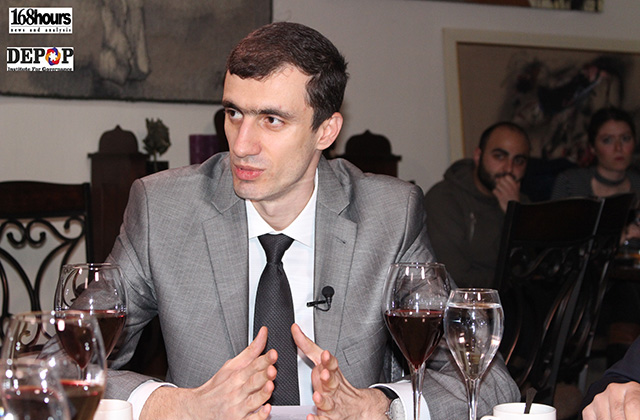
Ashot Yeghiazaryan: Despite everything, we should solve internal issues every day: there is corruption, shadow issues, which we raise as well.
Mesrop Arakelyan: 90% of our issues has nothing to do with EEU or the EU.
Ashot Yeghiazaryan: We disagree with the position that “Yelk” proposes—risk assessment. Risks should have been assessed in 2013, of course, I said that time decision was made to join without any assessments, and risks didn’t shrink, but increased, and every day a risk is created by remaining inside that union, as obviously, economically it can’t give anything to us. Proof is the negative tendency in our economy. However, political part also exists. What did it mean involving those countries inside EEU? It meant they should be deprived of sovereignty, and it means we should forget about complementary policy, and generally forget about economic collapse, we’ll lose our statehood if we stay inside EEU.
Mesrop Arakelyan: Is our economy ready to become a EU member?
Ashot Yeghiazaryan: Our economy should have respective assistance to become a EU member.
Mesrop Arakelyan: How many years will it take?
Ashot Yeghiazaryan: And how many years will take exiting from this collapse?
Mesrop Arakelyan: The guilty for the collapse are incumbent authorities.

Ashot Yeghiazaryan: Who voted in favor of joining EEU. You also aren’t principally sincere and don’t introduce the situation to the society.
Mesrop Arakelyan: Do you want to say everything was OK prior to membership to EEU?
Ashot Yeghiazaryan: No.
Mesrop Arakelyan: The guilty are Armenia’s authorities and not the membership to EEU.
Babken Tunyan: Mr. Arakelyan, are there any issues not conditioned by EEU, and which are possible to solve now?
Mesrop Arakelyan: Of course. I totally agree that we face this situation as a result of the format of relations with EEU, that we have negative reflection. However, normal authorities, elected by the people, have no necessity to keep the leadership by an external partner, not only of the EU, but with EEU as well may have normal partnership relations.
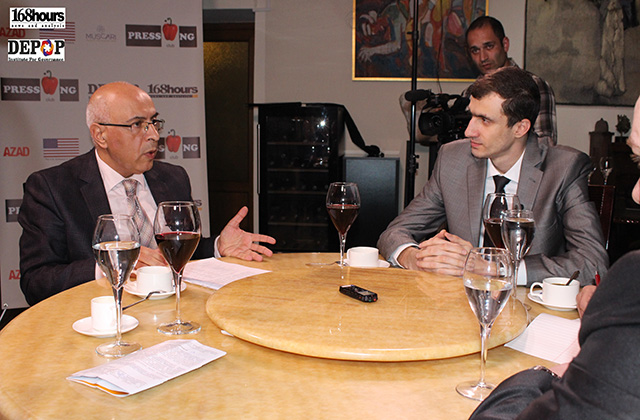
Ashot Yeghiazaryan: No, they drink a glass of brandy, and say you go and solve the issues.
Mesrop Arakelyan: The very Kyrgyzstan received 500 million for membership to EEU. There were certain agreements with us as well, but they didn’t occur.
Ashot Yeghiazaryan: So, can independence be sold?
Mesrop Arakelyan: Why? The guilty are exclusively the authorities and those very authorities would waste the 4 billion provided by the EU due to untalented policy…
Ashot Yeghiazaryan: Other political parties as well, as they all silently voted in favor of membership to EEU, gas agreements, they all voted in favor of united air defense system, joint troops.
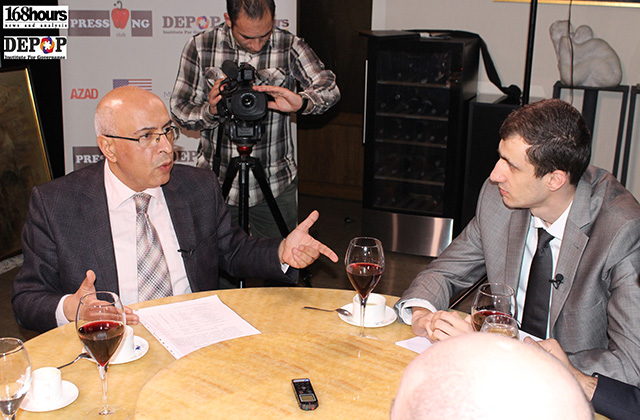
Mesrop Arakelyan: There are issues—shadow economy, sponsorship, current economic environment, that the peasant doesn’t know how to realize his/her agricultural products, there is no trust among any subject to spread big investment activity…The guilty for the risk is the policy pursued by current authorities. We consider Armenia has enough resources. Today people spend greater part of their life on earning their living, and unfortunately, we haven’t reached to the level to touch upon spiritual values.
Ashot Yeghiazaryan: And an attempt is made to cheat the society…
Mesrop Arakelyan: By what? The program we introduced is realistic: in case of providing 6% economic growth per year, which is rather realistic, all programs introduced by “Tsarukyan” alliance—both rise of salaries and pensions, as well as tax privileges provided to small businesses, which are perceived by the many as populism, suppose big expenditures, all that is possible.
Babken Tunyan: In all program average 6-7% economic growth is provided. In this regard RPA is more modest, this year it anticipated 3.2% economic growth, and it didn’t submit any index for the future. If it’s possible to provide 6-7% economic growth, what prevents RPA from providing normal economic growth? Isn’t there any desire or…?

Mesrop Arakelyan: Current economic policy in case of the same tax legislation, that tax burden on small business is on the level, that the field doesn’t record any development, that field provides only 1.5% tax revenues. The policy pursued by incumbent authorities, shadow economy level, sponsorship and corruption prevent economy development and their purpose is provision of their own growth, prosperity.
Babken Tunyan: Isn’t there a desire?
Mesrop Arakelyan: Of course, it lacks.
Vilen Khachatryan: I consider, trust factor is one of the most important ones, it’s the basis, bringing investments to economy. Economy super-centralization factor is also one of the most serious issues. Instead distribution schemes should function. Income distribution schemes in the society, which will help anyone to provide growth, are lacking. A wider layer of the society is being developed, which is surviving. The surviving society in future will provide election results. For 5 or 10 years they don’t think of developing economy, but of winning in the forthcoming elections. If such a program is set and not economy development, this is the snapshot.
Babken Tunyan: You mean the main issue is absence of trust, right?
Vilen Khachatryan: Yes, the main issue is lack of trust. If one asks what the purpose of economy is, it lacks. For instance, in Kyrgyzstan one of the issues formulated by Nazarbayev was as follows: appear among top 50 countries. We don’t know where are we going.
Mane Tandilyan: I consider the authorities want not to show modest indices, but they have the issue of keeping the power. Monopolist economies available in our country, are focused in their hands. It’s also beneficial to the leading power, as it’s very easy to govern a few people. Imagine, those means were in hands of the public, naturally, it wouldn’t be so governable and vulnerable. Naturally, where there is monopolist economy, development can’t be recorded. SMEs, middle class aren’t developing in our country, and they haven’t set that purpose.
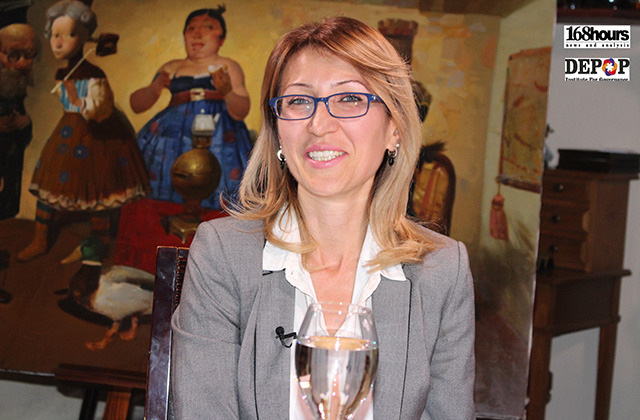
It’s the vision of developed and developing countries, where SMEs, the middle class should enlarge, and economy should develop though people, and yes, centralization should spread from a few oligarchs to the people. As political powers we should introduce Armenia the way we want to see. If we speak only of elimination of poverty, they can easily solve it—reduce taxes or exert certain artificial measures. I consider we should have a vision of state development.
Mesrop Arakelyan: We need to come out of today’s situation and provide minimum prosperity and then speak of economy development.
Mane Tandilyan: I agree with you, but I consider it’s weak starting from it, it means having no vision.
Ashot Yeghiazaryan: RPA and its government to be formed not only can develop 5%, but it can’t provide 2%, as there is no possibility under those economic and political restricted independence. Negative tendencies will continue, and we really face collapse and go on the edge of the abyss. When we say we can fight against monopolies and shadow, yes, we can, as there are no people among us relating to that shadow, corruption. Our political class today has an issue, and the issue is also in people, who are in such schemes and keep their presence, being in those schemes.

Babken Tunyan: Almost in all programs fight against monopolies is enshrined as well. Suppose, you have come to power, how are you going to eliminate that monopoly? What will you do that the market was divided among a few? Will you introduce exact steps in fight against that monopoly?
Ashot Yeghiazaryan: First, there are a few types of monopolies. Natural monopolies today are the most dangerous for Armenia, I mean gas, railway, aviation market. If import monopolies are meant, the issue is, that it’s natural that in any economy subjects aren’t equal, one is powerful, and the other—not, real government, leadership should settle in a way, that their activity was directed toward social, beneficial, favorable direction.
Babken Tunyan: Currently we have what we have, what should we do under current state of affairs?
Ashot Yeghiazaryan: The issue is, that the one possessing economic resources also possesses political authority, and naturally, they imagine their existence that way, i.e. non-free, non-competitive, as otherwise they’ll lose political leadership. It’s also an issue of the political class. When the political class, political figure implements its role, it’ll protect not business interests, in that case such issues will be solved by the rules of a fair game.
Mesrop Arakelyan: There should be a political will and sanctions. That’s why there is the Criminal Code, which is equal to sponsorship to eliminate corruption. In this local market we don’t have obvious monopolies, as, unfortunately, we don’t have local production on a level, that any businessman would be able to cover the whole market with one type of production and won’t allow others producing. As for import monopolies, recently the very government did so that there was an impression that the only issue of this country is banana import, and happiness of this nation was buying banana 200 drams cheaper, by that issue they also attempted to do imitation of political will. The point is that economy development, first and foremost, should be on such a level of small business, that local production could be competitive toward imported products.
Babken Tunyan: Do you mean we don’t need monopolies?
Mesrop Arakelyan: No, we have, it should be solved through the political will.
Babken Tunyan: If you come to power, you have the political will, what will you do regarding those monopolies with will?
Mesrop Arakelyan: An environment is being established, it’s being stated that legislation allows importing the product they want.
Vilen Khachatryan: It now allows as well.
Mesrop Arakelyan: Now it allows, however, we see preventions in case of import.
Babken Tunyan: I mean that, if, e.g. we all, five of us around the table, may import some product, but import is only beneficial to me, will you fight against me or let me work?
Mesrop Arakelyan: That’s why I touched upon internal issues as well. If imported goods are meant, which are sold in importer’s supermarket, under small business, first and foremost, that realization should be provided inside the country through the small business on account of supermarkets, developing small business. In that case the big businessman won’t appear in privileged conditions, if small business is able to comprise a considerable part in general economy other importers won’t appear in privileged conditions.
Babken Tunyan: Mr. Khachatryan, will you fight against monopolies?
Vilen Khachatryan: Of course. Law on protection of competition functions in Armenia and our Constitution almost guarantees existence of monopolies with expectation of not dictating a price, i.e. existence of monopoly is legally allowed. That’s why legislation should be changed. There are two types of legislation—protection of competition and anti-monopolistic. Thus, our legislation should be made anti-monopolistic, which will ban existence of any monopoly. I’d single out monopolies with both export and import components.
If a mining field enters any organization, suppose, finds a buyer with a higher price and attempts to sell, it can’t enter that field. We even have companies with monopolistic positions containing export component. Fits and foremost, fight against monopolies should be led through local production, as long as we depend on quantity of imported products, it’s the same, it’ll be beneficial in wholesale price, which simply economically will be cheaper and will provide the opportunity to the importer to bring. In Armenia, from ownership certificate, property distribution incorrect process centralization has emerged, which deprived 80-90% doing serious business, accordingly, that scheme should be disrupted to fight against monopolies. If sugar is imported by 10 people, the latter have the issue of entry to the supermarket.
Babken Tunyan: Nikol Pashinyan says 47 minutes are necessary to eliminate monopoly, i.e. it supposes that there is no need for any legal change.
Mane Tandilyan: It supposes, that it’s so obvious what should be done to get rid of monopolies, that it may really take that much time. In fact, I’m not sure that all monopolists are in the field of law. First and foremost, we should start from it as well: all those having such business, should come to tax, white, transparent field. I’m deeply convinced that although they don’t show all the salaries, which means they are able to provide selling by a cheaper price. If we bring them all to the tax field, we’ll see that price for sugar is raising, and when price for sugar raises, people will see that it may not be favorable to them, and they’ll start importing and there will be competition.
There are certain people importing by privileged prices on border and there are no obstacles for them, or here they avoid making tax payments, which again provides competition privilege and doesn’t provide the opportunity to compete with them. It’s possible to boost local production.
Babken Tunyan: Local sugar is already produced.
Mane Tandilyan: Yes, but we know who produces it, as he is able not to pay the taxes, and in that regard it’s the most beneficial for himself. Fight against monopolies should be started with bringing all to the tax field.
Babken Tunyan: In everybody’s programs there are provisions: rising pensions, salaries, reduction or increase of taxes. All this supposes certain changes of budget expenditures. I want to know do you have exact figure? What extra expenditures does implementation of your program suppose?
Mesrop Arakelyan: In our calculations, exclusively for implementation of our program, on account of the fact, that they suppose not only expenditures, but entries, they’ll comprise AMD 60-80 billion for a year. It’s rather realistic, even from the first budget year it’s possible to bring these programs into life.
Vilen Khachatryan: We haven’t divided additional workload. However, I can mention types of main entry sources: if in Armenia we observe only entry of goods without customs clearance, according to Global Financial Integrity it comprises USD 1.5 billion, only USD 500 million is customs clearance component. Second, budget subsidizing fund comprises USD 122 billion, we put the emphasis on it. Third, illegal financial flows. All possible entries are enough to cover those expenditures.
Mane Tandilyan: Our program introduces steps, which we call not what, but how. Every step, which you’ll read, supposes both income and expenditure, however, it isn’t only clear anticipating it now, but also not correct. For instance, we intend to free IT companies with more than 150 employees from profit tax. For the time being number of those companies doesn’t exceed 10, and if we accept that profit tax amounting AMD 50 million is being paid, yes, freeing them will decrease budget entry, however, as a result, how many IT companies will invest in Armenia and will enlarge? We have no answer to this question yet, as it’ll also depend on the business environment, competitive conditions, which we’ll provide in case of coming to power. And I’m sure, we’ll provide. At the moment it won’t be proper saying any numbers, as they won’t be precise.
Ashot Yeghiazaryan: Of course, we have our candidate for the PM. Calculations have been made, all macroeconomic targets are mentioned, the program is complete and comprehensive. Any program isn’t possible to implement, if it doesn’t provide external environment. That’s why we’re led by the point that membership to EEU should be immediately suspended, as it’s impossible under those conditions. If reserve is meant, that index has been calculated, from AMD 600 million to 1 billion, taking as a ground that upon assessments of international organizations, IMF, our shadow comprises 30-50% of the GDP. If we choose another vector for development, we sign the agreement on deep and comprehensive free trade area (DCFTA), get the opportunity to have relations with other partners, here other sources emerge, assessment of which, of course, can’t be provided, but synergic effect will be high. This is a scenario that the new government will start implementing immediately.
Babken Tunyan: In the end, I’d ask each of you to introduce in an accessible way what is anticipated to the citizen socially and economically?
Vilen Khachatryan: wWe’ll attempt to possibly mitigate social and economic issues citizens of our country face and aren’t able to give solutions for years, i.e. socially weak layer of the society, those facing economic issues will be in the center of our attention. By the scheme of wealth distribution, even by using luxury tax models, through budget policy we’ll attempt to raise the level of their well-being.
Mane Tandilyan: For me, as a citizen of Armenia, who just engaged with politics, it’s upsetting that in our country the third citizen is poor, and I consider it an offense to the dignity of our state, and I consider, we should get rid of that poverty and the label we have. The way to its solution is economy, democratic state, which will provide the opportunity to develop our state, put on a right route and it’ll provide the opportunity to invest systems providing good governance, due to which our people will have transparent salaries, high incomes and will be able to lead a good life.
Ashot Yeghiazaryan: We’ll create workplaces for wider layer of our society, we’ll connect the country to developed economic zones, people will have the opportunity to get a new job due to foreign investments, education, technologies. Our issue isn’t limited by providing workplaces to the population. Today only Armenia’s IT sector is integrated into markets of the USA, European states, and we may have a progress there.
Mesrop Arakelyan: Our team has enough political will to bring out Armenia from social and economic deep crisis. I’m sure, our programs are rather realistic and may be implemented in a short-term perspective. After we come to power Armenia’s citizen will have a dignified life and big trust toward the future of his/her child.
Ani Keshishyan
Razmik Martirosyan
Photos—“168 Hours”
“Pressing” Club is implemented in partnership with “DEPOP” Institute for Governance and “Azad Pharma AG” Swiss Company


























